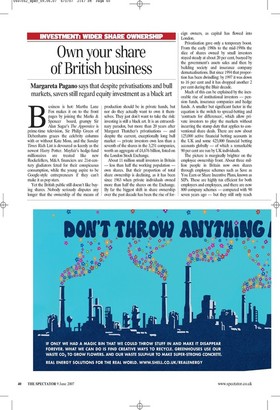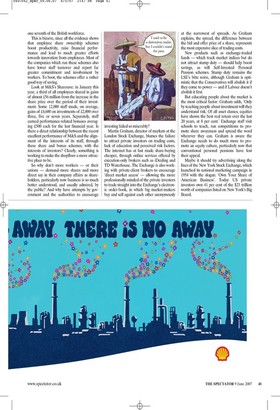Own your share of British business
Margareta Pagano says that despite privatisations and bull markets, savers still regard equity investment as a black art Business is hot: Martha Lane Fox makes it on to the front pages by joining the Marks & Spencer board, grumpy Sir Alan Sugar's The Apprentice is prime-time television, Sir Philip Green of Debenhams graces the celebrity columns with or without Kate Moss, and the Sunday Times Rich List is devoured as keenly as the newest Harry Potter. Mayfair's hedge-fund millionaires are treated like new Rockefellers, M&A financiers are 21st-century gladiators feted for their conspicuous consumption, while the young aspire to be Google-style entrepreneurs if they can't make it as pop stars.
Yet the British public still doesn't like buying shares. Nobody seriously disputes any longer that the ownership of the means of production should be in private hands, but nor do they actually want to own it themselves. They just don't want to take the risk: investing is still a black art. It is an extraordinary paradox, but more than 20 years after Margaret Thatcher's privatisations — and despite the current, exceptionally long bull market — private investors own less than a seventh of the shares in the 3,251 companies, worth an aggregate of £4,676 billion, listed on the London Stock Exchange.
About 11 million small investors in Britain — less than half the working population — own shares. But their proportion of total share ownership is declining, as it has been since 1963 when private individuals owned more than half the shares on the Exchange. By far the biggest shift in share ownership over the past decade has been the rise of foreign owners, as capital has flowed into London.
Privatisation gave only a temporary boost. From the early 1980s to the mid-1990s the slice of shares owned by small investors stayed steady at about 20 per cent, buoyed by the government's assets sales and then by building society and insurance company demutualisations. But since 1994 that proportion has been dwindling: by 1997 it was down to 16 per cent and it has dropped another 2 per cent during the Blair decade.
Much of this can be explained by the inexorable rise of institutional investors — pension funds, insurance companies and hedge funds. A smaller but significant factor in the equation is the switch to spread-betting and 'contracts for differences', which allow private investors to play the markets without incurring the stamp duty that applies to conventional share deals. There are now about 125,000 active financial betting accounts in the UK and some 425,000 financial betting accounts globally — of which a remarkable 90 per cent are run by UK individuals.
The picture is marginally brighter on the employee ownership front. About three million people in Britain now own shares through employee schemes such as Save as You Earn or Share Incentive Plans, known as SIPs. These are highly tax efficient for both employers and employees, and there are now 800 company schemes — compared with 90 seven years ago — but they still only reach one seventh of the British workforce.
This is bizarre, since all the evidence shows that employee share ownership schemes boost productivity, raise financial performance and lead to much greater efforts towards innovation from employees. Most of the companies which run these schemes also have lower staff turnover and report far greater commitment and involvement by workers. To boot, the schemes offer a rather good way of saving.
Look at M&S's Sharesave: in January this year, a third of all employees shared in gains of almost £56 million from the increase in the share price over the period of their investment. Some 12,000 staff made, on average, gains of £4,600 on investments of £2,000 over three, five or seven years. Separately, staff earned performance-related bonuses averaging £500 each for the last financial year. Is there a direct relationship between the recent excellent performance of M&S and the alignment of the interests of its staff through these share and bonus schemes, with the interests of investors? Clearly, something is working to make the shopfloor a more attractive place to be.
So why don't more workers — or their unions — demand more shares and more direct say in their company affairs as shareholders, particularly now business is so much better understood, and usually admired, by the public? And why have attempts by government and the authorities to encourage investing failed so miserably?
Martin Graham, director of markets at the London Stock Exchange, blames the failure to attract private investors on trading costs, lack of education and perceived risk factors. The internet has at last made share-buying cheaper, through online services offered by execution-only brokers such as iDealing and TD Waterhouse. The Exchange is also working with private-client brokers to encourage 'direct market access' — allowing the more professionally minded of the private investors to trade straight into the Exchange's electronic order-book, in which big market-makers buy and sell against each other anonymously at the narrowest of spreads. As Graham explains, the spread, the difference between the bid and offer price of a share, represents the most expensive slice of trading costs.
New products such as exchange-traded funds — which track market indices but do not attract stamp duty — should help boost savings, as will Self-Invested Personal Pension schemes. Stamp duty remains the LSE's bête noire, although Graham is optimistic that the Conservatives will abolish it if they come to power — and if Labour doesn't abolish it first.
But educating people about the market is the most critical factor. Graham adds, 'Only by teaching people about investment will they understand risk. Of all asset classes, equities have shown the best real return over the last 20 years, at 8 per cent.' Exchange staff visit schools to teach, run competitions to promote share awareness and spread the word wherever they can. Graham is aware the Exchange needs to do much more to promote an equity culture, particularly now that conventional personal pensions have lost their appeal.
Maybe it should try advertising along the lines of the New York Stock Exchange, which launched its national marketing campaign in 1954 with the slogan: 'Own Your Share of American Business'. Today US private investors own 41 per cent of the $23 trillion worth of companies listed on New York's Big Board.





























































 Previous page
Previous page